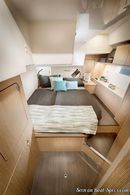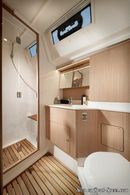Bavaria C50 Standard
Sailboat specifications
The Bavaria C50 is a 49’2” (14.99m) cruising sailboat designed by Cossutti Yacht Design (Italy). She is built since 2018 by Bavaria Yachts (Germany).
The Bavaria C50 is as well listed, on Boat-Specs.com, in Shoal draft and Furling mainsail version (see all the versions compared).
The Bavaria C50 is as well listed, on Boat-Specs.com, in Shoal draft and Furling mainsail version (see all the versions compared).
Bavaria C50's main features
- Model
- Bavaria C50
- Version
- Standard
- Hull type
- Monohull
- Category
- Cruising sailboat
- Sailboat builder
- Sailboat designer
- Sailboat range
- Country
- Germany
- Construction
- Hull and deck: GRP (glass reinforced polyester)
- First built hull
- 2018
- Last built hull
- Still in production
- Appendages
- Keel : L-shaped keel (with bulb)
- Helm
- Twin helm wheels
- Rudder
- Single spade rudder
- Unsinkable
- No
- Trailerable
- No
- EC design categoryiThe CE design category indicates the ability to cope with certain weather conditions (the sailboat is designed for these conditions)
A: Wind < force 9, Waves < 10m
B: Wind < force 8, Waves < 8m
C: Wind < force 6, Waves < 4m
D: Wind < force 4, Waves < 0,5m - A
- Standard public price ex. VAT (indicative only)
- About284 000 €(2020)
Bavaria C50's main dimensions
- Overall length
- 51’15.55 m
- Hull length
- 49’ 2”14.99 m
- Waterline length
- 47’ 5”14.44 m
- Beam (width)
- 16’ 5”5 m
- Draft
- 7’ 6”2.3 m
- Mast height from DWL
- 76’ 4”23.25 m
- Light displacement (MLC)
- 34150 lb15490 kg
- Capacity
- 9921 lb4500 kg
Bavaria C50's rig and sails
- Upwind sail area
- 1453 ft²135 m²
- Downwind sail area
- 2917 ft²271 m²
- Mainsail area
- 818 ft²76 m²
- Genoa area
- 635 ft²59 m²
- Asymmetric spinnaker area
- 2099 ft²195 m²
- Code 0 area
- 1238 ft²115 m²
- IiFore triangle height (from mast foot to fore stay top attachment)
- 65’ 7”20 m
- JiFore triangle base (from mast foot to bottom of forestay)
- 18’ 11”5.77 m
- PiMainsail hoist measurement (from tack to head)
- 62’ 10”19.15 m
- EiMainsail foot measurement (from tack to clew)
- 21’ 11”6.66 m
- Rigging type
- Sloop Marconi 9/10
- Mast configuration
- Deck stepped mast
- Rotating spars
- No
- Number of levels of spreaders
- 2
- Spreaders angle
- Swept-back
- Spars construction
- Aluminum spars
- Standing rigging
- 1x19 strand wire discontinuous
Bavaria C50's performances
- Upwind sail area to displacementiThe ratio sail area to displacement is obtained by dividing the sail area by the boat's displaced volume to the power two-thirds.
The ratio sail area to displacement can be used to compare the relative sail plan of different sailboats no matter what their size.
Upwind: under 18 the ratio indicates a cruise oriented sailboat with limited performances especially in light wind, while over 25 it indicates a fast sailboat. - 234 ft²/T21.73 m²/T
- Downwind sail area to displacementiThe ratio sail area to displacement is obtained by dividing the sail area by the boat's displaced volume to the power two-thirds.
The ratio sail area to displacement can be used to compare the relative sail plan of different sailboats no matter what their size. - 469 ft²/T43.61 m²/T
- Displacement-length ratio (DLR)iThe Displacement Length Ratio (DLR) is a figure that points out the boat's weight compared to its waterline length. The DLR is obtained by dividing the boat's displacement in tons by the cube of one one-hundredth of the waterline length (in feet).
The DLR can be used to compare the relative mass of different sailboats no matter what their length:
a DLR less than 180 is indicative of a really light sailboat (race boat made for planning), while a DLR greater than 300 is indicative of a heavy cruising sailboat. - 146
- Critical hull speediAs a ship moves in the water, it creates standing waves that oppose its movement. This effect increases dramatically the resistance when the boat reaches a speed-length ratio (speed-length ratio is the ratio between the speed in knots and the square root of the waterline length in feet) of about 1.2 (corresponding to a Froude Number of 0.35) . This very sharp rise in resistance, between speed-length ratio of 1.2 to 1.5, is insurmountable for heavy sailboats and so becomes an apparent barrier. This leads to the concept of "hull speed".
The hull speed is obtained by multiplying the square root of the waterline length (in feet) by 1.34. - 9.22 knots
Bavaria C50's auxiliary engine
- Engine(s)
- 1 inboard engine
- Engine(s) power
- 80 HP
- Fuel type
- Diesel
- Fuel tank capacity
- 66 gal250 liters
Bavaria C50's accommodations and layout
- Cockpit
- Closed aft cockpit
- Cabin(s) (min./max.)
- 3 / 6
- Berth(s) (min./max.)
- 6 / 14
- Head(s) (min./max.)
- 2 / 4
- Freshwater tank capacity
- 171.7 gal650 liters


Bavaria Yachts Bavaria C50 - - 1/12
Picture extracted from the commercial documentation © Bavaria Yachts
Picture extracted from the commercial documentation © Bavaria Yachts


Bavaria Yachts Bavaria C50 layout - - 2/12
Picture extracted from the commercial documentation © Bavaria Yachts
Picture extracted from the commercial documentation © Bavaria Yachts


Bavaria Yachts Bavaria C50 sailing - - 3/12
Picture extracted from the commercial documentation © Bavaria Yachts
Picture extracted from the commercial documentation © Bavaria Yachts


Bavaria Yachts Bavaria C50 sailing - - 4/12
Picture extracted from the commercial documentation © Bavaria Yachts
Picture extracted from the commercial documentation © Bavaria Yachts


Bavaria Yachts Bavaria C50 sailing - - 5/12
Picture extracted from the commercial documentation © Bavaria Yachts
Picture extracted from the commercial documentation © Bavaria Yachts


Bavaria Yachts Bavaria C50 sailing - - 6/12
Picture extracted from the commercial documentation © Bavaria Yachts
Picture extracted from the commercial documentation © Bavaria Yachts


Bavaria Yachts Bavaria C50 interior and accommodations - - 7/12
Picture extracted from the commercial documentation © Bavaria Yachts
Picture extracted from the commercial documentation © Bavaria Yachts


Bavaria Yachts Bavaria C50 interior and accommodations - - 8/12
Picture extracted from the commercial documentation © Bavaria Yachts
Picture extracted from the commercial documentation © Bavaria Yachts


Bavaria Yachts Bavaria C50 interior and accommodations - - 9/12
Picture extracted from the commercial documentation © Bavaria Yachts
Picture extracted from the commercial documentation © Bavaria Yachts


Bavaria Yachts Bavaria C50 interior and accommodations - - 10/12
Picture extracted from the commercial documentation © Bavaria Yachts
Picture extracted from the commercial documentation © Bavaria Yachts


Bavaria Yachts Bavaria C50 interior and accommodations - - 11/12
Picture extracted from the commercial documentation © Bavaria Yachts
Picture extracted from the commercial documentation © Bavaria Yachts


Bavaria Yachts Bavaria C50 detail - - 12/12
Picture extracted from the commercial documentation © Bavaria Yachts
Picture extracted from the commercial documentation © Bavaria Yachts
Similar sailboats that may interest you:
Sailboats
First built hull
Hull length
2010
49’ 2”14.99 m
1988
52’ 6”16 m
2010
53’16.16 m
2014
53’16.16 m
2016
46’ 4”14.12 m
2017
53’16.16 m
2015
51’ 8”15.75 m
2016
49’ 1”14.98 m
2016
49’ 1”14.98 m
2000
52’ 6”16 m
2017
50’ 11”15.51 m
2017
51’ 8”15.75 m
2020
50’ 11”15.5 m
2018
44’ 7”13.6 m
2018
49’ 2”14.99 m